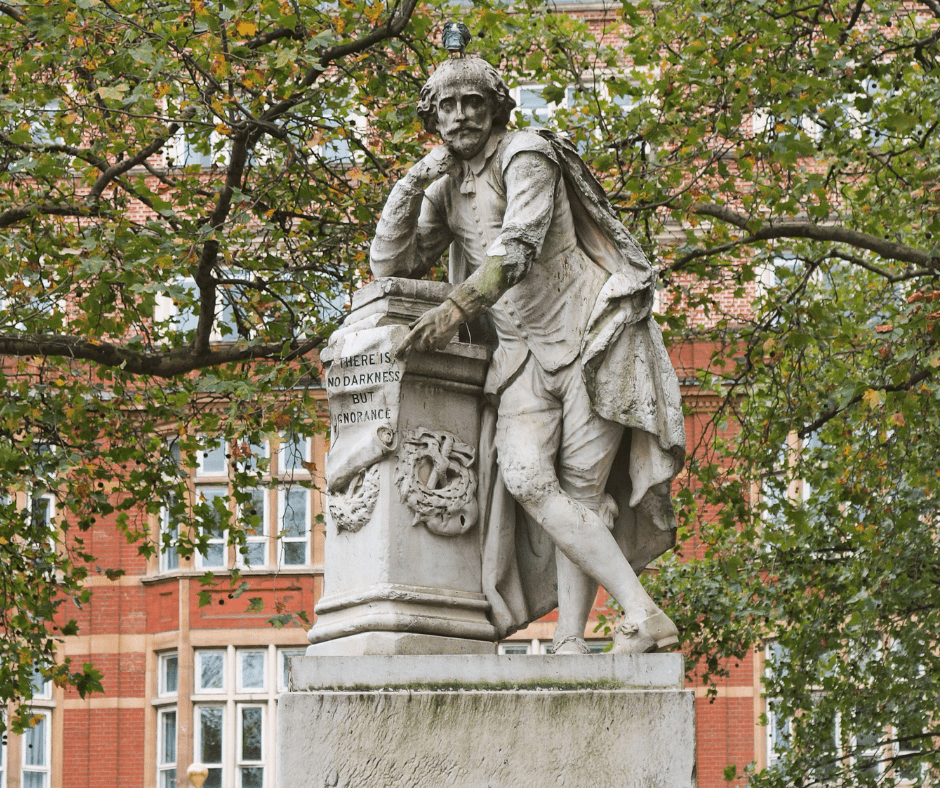If you are passionate about the English language and mostly about idioms, we have some amazing news: some of the expressions you’ve been using regularly have actually been invented by …Shakespeare. having fathered over 1700 words or expressions, the English playwright, poet, and actor, widely regarded as the greatest writer in the English language and the world’s greatest dramatist, is known to have contributed massively to the development of the English language,
Today’s blog entry is dedicated to those expressions and idioms that Shakespeare’s characters introduced to the English language. Let’s explore some of them together. Who knows, by the end of this article, you’ll maybe realize you’ve been quoting Hamlet all along.
- „All that glisters is not gold.” (Merchant of Venice)
We usually use this phrase after we discover that something that looks good turns out not to be that great, and substitute „glitters” for „glisters.” - “As good luck would have it” (The Merry Wives of Windsor)
This means something happened to you that was pure chance or luck. - „Break the ice” (The Taming of the Shrew)
Often when you meet someone for the first time, you „break the ice” by asking them polite questions about themselves. - „Clothes make the man.” (Hamlet)
Although not always true, this phrase implies that how a person dresses tells you something about who they are as a person. - “Cold comfort” (King John)
It’s a form of consolidation, but it is a bad consolidation since the whole situation is bad like dropping the inflation rate for millions of unemployed would be a “cold comfort.” - “Come what come may” („come what may”) (Macbeth)
Whatever is going to happen is going to happen. You are accepting that fact. - “Devil incarnate” (Titus Andronicus)
This describes someone that is evil and scheming like a reincarnation of the devil. - “Eaten me out of house and home” (2 Henry IV)
You might hear parents say this about teenagers a lot. They’ve eaten so much that all the food is gone. - „Fair play” (The Tempest)
Follow the rules, especially in competitions or sports - „A laughing stock” (The Merry Wives of Windsor)
To be a laughing stock is to be considered a joke by many people.
- „In a pickle” (The Tempest)
To be „in a pickle” is to be in trouble or in a situation that you cannot easily get out of. - „It’s Greek to me” (Julius Caesar)
When you say, „it’s Greek to me,” you are admitting that you do not know or understand something. - “Pound of flesh” (The Merchant of Venice)
When this phrase is used it is talking about a cruel or unusual punishment. - “Such stuff as dreams are made on” (The Tempest)
Describes when something is so good that it is just like a dream. - „The lady doth protest too much” (Hamlet)
If someone denies something more than once, you can say „the lady doth protest too much,” meaning you think that they feel the opposite of what they are saying. - „Too much of a good thing” (As You Like It)
It is said that „too much of a good thing” (i.e. money, love, food) is not necessarily good for you. - „Wear one’s heart on one’s sleeve” (Othello)
To be a hopeless romantic (or be open and honest about how you feel) is to wear one’s heart on one’s sleeve. - “Wild-goose chase” (Romeo and Juliet)
When someone leads you on a wild chase to find them, it is commonly known as a wild-goose chase. - “What’s done is done” (Macbeth)
It is done, and there is no going back. You must simply deal with the consequences.
These old, but very commonly used expressions will definitely help give your vocabulary a boost! If you want to further your study and discover other useful things about the English language, book a course with Lektor!


